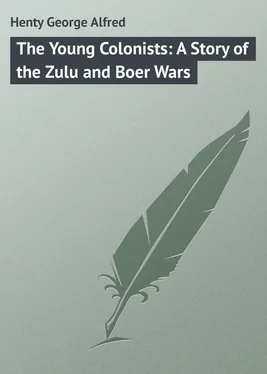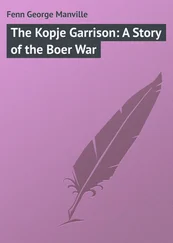George Henty - The Young Colonists - A Story of the Zulu and Boer Wars
Здесь есть возможность читать онлайн «George Henty - The Young Colonists - A Story of the Zulu and Boer Wars» — ознакомительный отрывок электронной книги совершенно бесплатно, а после прочтения отрывка купить полную версию. В некоторых случаях можно слушать аудио, скачать через торрент в формате fb2 и присутствует краткое содержание. Жанр: foreign_prose, foreign_children, на английском языке. Описание произведения, (предисловие) а так же отзывы посетителей доступны на портале библиотеки ЛибКат.
- Название:The Young Colonists: A Story of the Zulu and Boer Wars
- Автор:
- Жанр:
- Год:неизвестен
- ISBN:нет данных
- Рейтинг книги:4 / 5. Голосов: 1
-
Избранное:Добавить в избранное
- Отзывы:
-
Ваша оценка:
- 80
- 1
- 2
- 3
- 4
- 5
The Young Colonists: A Story of the Zulu and Boer Wars: краткое содержание, описание и аннотация
Предлагаем к чтению аннотацию, описание, краткое содержание или предисловие (зависит от того, что написал сам автор книги «The Young Colonists: A Story of the Zulu and Boer Wars»). Если вы не нашли необходимую информацию о книге — напишите в комментариях, мы постараемся отыскать её.
The Young Colonists: A Story of the Zulu and Boer Wars — читать онлайн ознакомительный отрывок
Ниже представлен текст книги, разбитый по страницам. Система сохранения места последней прочитанной страницы, позволяет с удобством читать онлайн бесплатно книгу «The Young Colonists: A Story of the Zulu and Boer Wars», без необходимости каждый раз заново искать на чём Вы остановились. Поставьте закладку, и сможете в любой момент перейти на страницу, на которой закончили чтение.
Интервал:
Закладка:
“We have brought down four teams of sixteen oxen each,” Dick said, “from near Newcastle, to be hired to the government.”
“That is right, my lads,” the officer said, “we have room for plenty more. This is the form of contract. You engage to serve the government by the month; you bear any damages which may take place from wear and tear of the roads, breakdowns, and the other ordinary accidents of travel; the government engages to make good any loss or damage which may occur from the action of the enemy. This is not,” he said, smiling, “likely to take place, but still those are the terms. Have you any authority from your fathers, to whom, I suppose, the teams belong, to sign the contracts for them?”
“Yes, sir,” Dick said. “Here is a paper from my father, and one from Tom Jackson’s father, saying that they agree to be bound by the terms of the contract, and that they authorise us to sign in their names. We are going with the waggons, sir, to look after the Kaffirs.”
“Well,” the officer said, “you can do as you like about that; but if you speak Kaffir it will be useful – only, mind, you will have to provision yourselves. From the day the teams are taken up, rations of mealies will be served to the Kaffirs at the various halting-places, but there is no provision for rations of white men. The cattle, too, will be fed, but you will have to see to yourselves.”
“Yes, sir; we expected to do so.”
“Well, you had better fetch the teams up to the yard. I must inspect and pass them before they are taken up. Bring them round at once; then they will be loaded to-night, and start at daybreak to-morrow.”
The teams were brought round to the yard, and immediately passed by the officer, who indeed remarked upon the excellence of the animals. The Kaffirs were directed to outspan or unyoke the oxen, for whom rations of hay and grain were at once issued.
The boys returned to the town and made their purchases, which were carried down by two Kaffirs and stored in the waggons, which were already in process of being loaded – two with boxes of ammunition, the others with miscellaneous stores for the troops. They slept at an hotel, and next morning at daybreak presented themselves at the yard. The Kaffirs were already harnessing up the oxen, and in a quarter of an hour the four waggons, with sixteen others, started for the Tugela.
It was now the middle of December. Early in the month commissioners had been sent to Cetewayo with the terms decided upon by Sir Bartle Frere. The first clauses of the document contained the settlement of the disputed frontier, and fines were fixed to be paid by the chiefs whose men had committed forays across the borders; it then went on to demand that the whole of Cetewayo’s army should at once be disbanded; freedom of marriage was to be allowed, when the parties thereto were of age; justice was to be impartially administered; missionaries to be allowed to reside in the Zulu country; British residents to be appointed; all disputes between Zulus and Europeans to be referred to the king and resident; and no expulsion from Zulu territory was to be carried into effect without the distinct approval of the resident.
It was intimated to the king that unless these terms were accepted by the 11th of January the army would at once invade the country. Few men expected that the Zulu king would tamely submit to conditions which would deprive him of all the military power in which he delighted, and would reduce him to a state of something like dependency upon the British.
During the month of December General Thesiger, who commanded the British forces in South Africa, made every effort to prepare for hostilities. The regiments which were at the Cape were brought round by sea; a brigade of seamen and marines was landed from the ships of war; several corps of irregular horse were raised among the colonists; and regiments of natives were enrolled. Before the date by which the king was to send in his answer the troops were assembled along the frontier in the following disposition: —
Number 1 Column.
( Headquarters, Thring’s Post, Lower Tugela .)
Commandant. – Colonel C.K. Pearson, the Buffs.
Naval Brigade. – 170 bluejackets and marines of
H.M.S. Active (with one Gatling and two 7-pounder guns), under
Captain Campbell, R.N.
Royal Artillery. – Two 7-pounder guns and rocket-battery, under
Lieutenant W.N. Lloyd, R.A.
Infantry. – 2nd battalion, 3rd Buffs, under Lieutenant-Colonel H. Parnell.
Mounted Infantry. – 100 men under Captain Barrow, 19th Hussars.
Volunteers. – Durban Rifles, Natal Hussars, Stanger Rifles, Victoria
Rifles, Alexandra Rifles. Average, forty men per corps – all mounted.
Native Contingent. – 1000 men under Major Graves, the Buffs.
Number Two Column.
( Headquarters, Helpmakaar, near Rorke’s Drift.)
Commandant. – Colonel Glyn, 1st battalion, 24th Regiment.
Royal Artillery. – N. battery, 5th brigade, Royal Artillery
(with 7-pounder guns), under Major A. Harness, R.A.
Infantry. – Seven companies 1st battalion, 24th Regiment, and 2nd battalion, 24th Regiment, under Lieutenant-Colonel Degacher.
Natal Mounted Police. – Commanded by Major Dartnell.
Volunteers. – Natal Carabineers, Buffalo Border Guard, Newcastle Mounted
Rifles – all mounted; average, forty men.
Native Contingent – 1000 men, under Commandant Lonsdale, late 74th Highlanders.
Number 3 Column.
( Headquarters, Utrecht.)
Commandant. – Colonel Evelyn Wood, V.C. C.B., 40th Regiment.
Royal Artillery. – 11th battery, 7th brigade, R.A. (with four 7-pounder guns), under Major E. Tremlett, R.A.
Infantry. – 1st battalion 13th Regiment, and 90th Regiment.
Mounted Infantry. – 100 men, under Major J.C. Russell, 12th Lancers.
Frontier Light Horse. – 200 strong, under Major Redvers Buller, C.B., 60th Rifles.
Volunteers. – The Kaffrarian Vanguard, Commandant Schermbrucker, 100 strong.
Native Contingent. – The Swazis, our native allies, some 5000 strong.
In the first fortnight of their engagement the waggons travelled backward and forward between Pieter-Maritzburg and Grey Town, which for the time formed the base for the column of Colonel Glyn. The distance of the town from the capital was forty-five miles, and as the waggons travelled at the rate of fifteen miles a day, they were twelve days in accomplishing two double journeys. When they were loaded up the third time, they received orders to go straight through to the headquarters of the column at Helpmakaar. The boys were pleased at the change, for the road as far as Grey Town was a good one.
They reached Grey Town for the third time on the 2nd of January. Here they found the place in a state of great excitement, a mounted messenger having arrived that morning with the news that Cetewayo had refused all demands and that large bodies of the Zulus were marching towards the frontier to oppose the various columns collecting there.
On arriving at the government-yard the lads received orders at once to unload the waggons and to take on the stores of the 2nd battalion of the 24th, which was to march from Grey Town the next morning. The start was delayed until the afternoon, as sufficient waggons had not arrived to take on their baggage. The road was rough, and it was late in the afternoon before they arrived at the Mooin River.
The weather had set in wet, the river was in flood, and the oxen had immense difficulty in getting the waggons across. Two teams had to be attached to each waggon, and even then it was as much as they could do to get across, for the water was so high that it nearly took them off their feet.
The troops were taken over in punts, and, after crossing, a halt was made for the night.
Читать дальшеИнтервал:
Закладка:
Похожие книги на «The Young Colonists: A Story of the Zulu and Boer Wars»
Представляем Вашему вниманию похожие книги на «The Young Colonists: A Story of the Zulu and Boer Wars» списком для выбора. Мы отобрали схожую по названию и смыслу литературу в надежде предоставить читателям больше вариантов отыскать новые, интересные, ещё непрочитанные произведения.
Обсуждение, отзывы о книге «The Young Colonists: A Story of the Zulu and Boer Wars» и просто собственные мнения читателей. Оставьте ваши комментарии, напишите, что Вы думаете о произведении, его смысле или главных героях. Укажите что конкретно понравилось, а что нет, и почему Вы так считаете.












